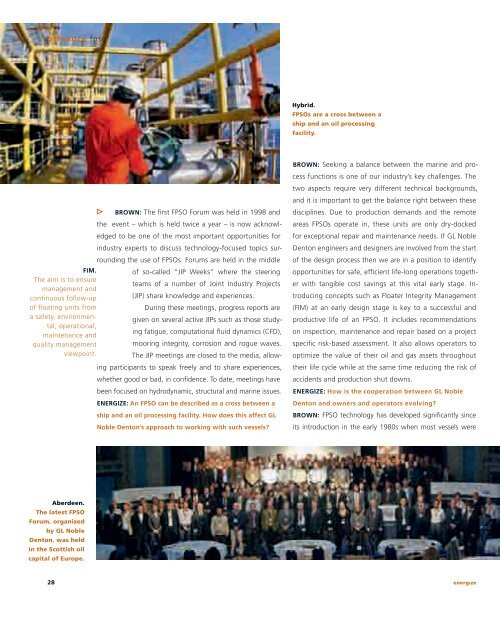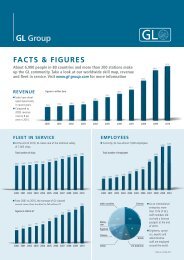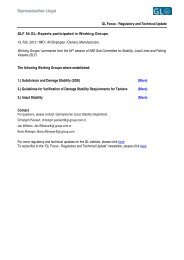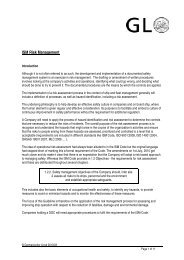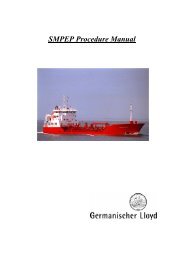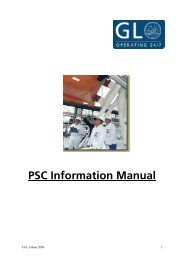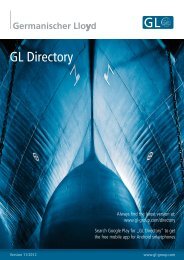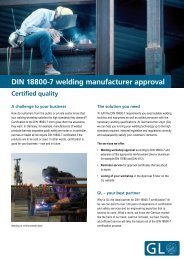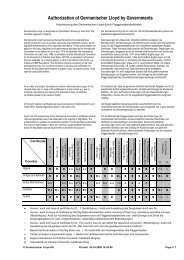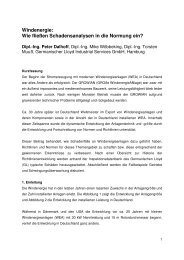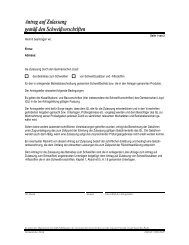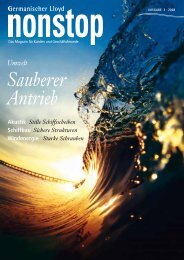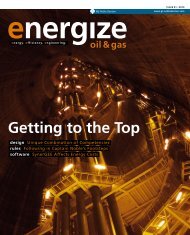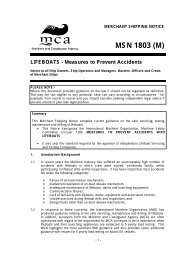energize oil & gas 01/2011 - GL Group
energize oil & gas 01/2011 - GL Group
energize oil & gas 01/2011 - GL Group
You also want an ePaper? Increase the reach of your titles
YUMPU automatically turns print PDFs into web optimized ePapers that Google loves.
offshore fpso<br />
BROWN: The first FPSO Forum was held in 1998 and<br />
the event – which is held twice a year – is now acknowl-<br />
edged to be one of the most important opportunities for<br />
industry experts to discuss technology-focused topics sur-<br />
FIM.<br />
rounding the use of FPSOs. Forums are held in the middle<br />
of so-called “JIP Weeks” where the steering<br />
The aim is to ensure<br />
management and<br />
continuous follow-up<br />
teams of a number of Joint Industry Projects<br />
(JIP) share knowledge and experiences.<br />
of floating units from<br />
During these meetings, progress reports are<br />
a safety, environmental,<br />
operational,<br />
maintenance and<br />
given on several active JIPs such as those studying<br />
fatigue, computational fluid dynamics (CFD),<br />
quality management mooring integrity, corrosion and rogue waves.<br />
viewpoint. The JIP meetings are closed to the media, allow-<br />
Aberdeen.<br />
The latest FPSO<br />
Forum, organized<br />
by <strong>GL</strong> Noble<br />
Denton, was held<br />
in the Scottish <strong>oil</strong><br />
capital of Europe.<br />
ing participants to speak freely and to share experiences,<br />
whether good or bad, in confidence. To date, meetings have<br />
been focused on hydrodynamic, structural and marine issues.<br />
ENERGIZE: An FPSO can be described as a cross between a<br />
ship and an <strong>oil</strong> processing facility. How does this affect <strong>GL</strong><br />
Noble Denton’s approach to working with such vessels?<br />
Hybrid.<br />
FPSOs are a cross between a<br />
ship and an <strong>oil</strong> processing<br />
facility.<br />
BROWN: Seeking a balance between the marine and pro-<br />
cess functions is one of our industry’s key challenges. The<br />
two aspects require very different technical backgrounds,<br />
and it is important to get the balance right between these<br />
disciplines. Due to production demands and the remote<br />
areas FPSOs operate in, these units are only dry-docked<br />
for exceptional repair and maintenance needs. If <strong>GL</strong> Noble<br />
Denton engineers and designers are involved from the start<br />
of the design process then we are in a position to identify<br />
opportunities for safe, efficient life-long operations together<br />
with tangible cost savings at this vital early stage. Introducing<br />
concepts such as Floater Integrity Management<br />
(FIM) at an early design stage is key to a successful and<br />
productive life of an FPSO. It includes recommendations<br />
on inspection, maintenance and repair based on a project<br />
specific risk-based assessment. It also allows operators to<br />
optimize the value of their <strong>oil</strong> and <strong>gas</strong> assets throughout<br />
their life cycle while at the same time reducing the risk of<br />
accidents and production shut downs.<br />
ENERGIZE: How is the cooperation between <strong>GL</strong> Noble<br />
Denton and owners and operators evolving?<br />
BROWN: FPSO technology has developed significantly since<br />
its introduction in the early 1980s when most vessels were<br />
28 energıze


